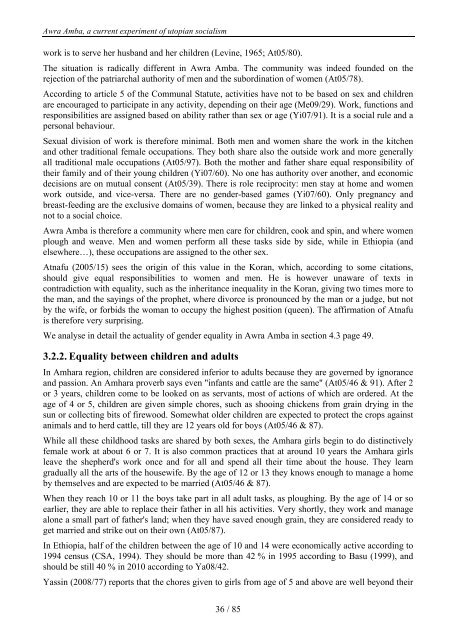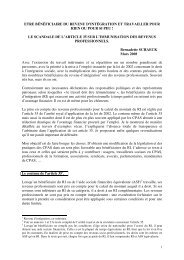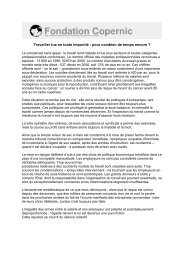Awra Amba RJ 300612 EN - Contacter un comité local d'Attac
Awra Amba RJ 300612 EN - Contacter un comité local d'Attac
Awra Amba RJ 300612 EN - Contacter un comité local d'Attac
You also want an ePaper? Increase the reach of your titles
YUMPU automatically turns print PDFs into web optimized ePapers that Google loves.
<strong>Awra</strong> <strong>Amba</strong>, a current experiment of utopian socialism<br />
work is to serve her husband and her children (Levine, 1965; At05/80).<br />
The situation is radically different in <strong>Awra</strong> <strong>Amba</strong>. The comm<strong>un</strong>ity was indeed fo<strong>un</strong>ded on the<br />
rejection of the patriarchal authority of men and the subordination of women (At05/78).<br />
According to article 5 of the Comm<strong>un</strong>al Statute, activities have not to be based on sex and children<br />
are encouraged to participate in any activity, depending on their age (Me09/29). Work, f<strong>un</strong>ctions and<br />
responsibilities are assigned based on ability rather than sex or age (Yi07/91). It is a social rule and a<br />
personal behaviour.<br />
Sexual division of work is therefore minimal. Both men and women share the work in the kitchen<br />
and other traditional female occupations. They both share also the outside work and more generally<br />
all traditional male occupations (At05/97). Both the mother and father share equal responsibility of<br />
their family and of their yo<strong>un</strong>g children (Yi07/60). No one has authority over another, and economic<br />
decisions are on mutual consent (At05/39). There is role reciprocity: men stay at home and women<br />
work outside, and vice-versa. There are no gender-based games (Yi07/60). Only pregnancy and<br />
breast-feeding are the exclusive domains of women, because they are linked to a physical reality and<br />
not to a social choice.<br />
<strong>Awra</strong> <strong>Amba</strong> is therefore a comm<strong>un</strong>ity where men care for children, cook and spin, and where women<br />
plough and weave. Men and women perform all these tasks side by side, while in Ethiopia (and<br />
elsewhere…), these occupations are assigned to the other sex.<br />
Atnafu (2005/15) sees the origin of this value in the Koran, which, according to some citations,<br />
should give equal responsibilities to women and men. He is however <strong>un</strong>aware of texts in<br />
contradiction with equality, such as the inheritance inequality in the Koran, giving two times more to<br />
the man, and the sayings of the prophet, where divorce is prono<strong>un</strong>ced by the man or a judge, but not<br />
by the wife, or forbids the woman to occupy the highest position (queen). The affirmation of Atnafu<br />
is therefore very surprising.<br />
We analyse in detail the actuality of gender equality in <strong>Awra</strong> <strong>Amba</strong> in section 4.3 page 49.<br />
3.2.2. Equality between children and adults<br />
In Amhara region, children are considered inferior to adults because they are governed by ignorance<br />
and passion. An Amhara proverb says even "infants and cattle are the same" (At05/46 & 91). After 2<br />
or 3 years, children come to be looked on as servants, most of actions of which are ordered. At the<br />
age of 4 or 5, children are given simple chores, such as shooing chickens from grain drying in the<br />
s<strong>un</strong> or collecting bits of firewood. Somewhat older children are expected to protect the crops against<br />
animals and to herd cattle, till they are 12 years old for boys (At05/46 & 87).<br />
While all these childhood tasks are shared by both sexes, the Amhara girls begin to do distinctively<br />
female work at about 6 or 7. It is also common practices that at aro<strong>un</strong>d 10 years the Amhara girls<br />
leave the shepherd's work once and for all and spend all their time about the house. They learn<br />
gradually all the arts of the housewife. By the age of 12 or 13 they knows enough to manage a home<br />
by themselves and are expected to be married (At05/46 & 87).<br />
When they reach 10 or 11 the boys take part in all adult tasks, as ploughing. By the age of 14 or so<br />
earlier, they are able to replace their father in all his activities. Very shortly, they work and manage<br />
alone a small part of father's land; when they have saved enough grain, they are considered ready to<br />
get married and strike out on their own (At05/87).<br />
In Ethiopia, half of the children between the age of 10 and 14 were economically active according to<br />
1994 census (CSA, 1994). They should be more than 42 % in 1995 according to Basu (1999), and<br />
should be still 40 % in 2010 according to Ya08/42.<br />
Yassin (2008/77) reports that the chores given to girls from age of 5 and above are well beyond their<br />
36 / 85

















